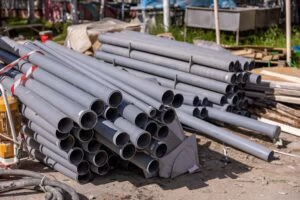Places to buy nails and screws
Explore different stores and retailers to find the right nails and screws for your building and woodworking projects. Hardware stores, big box stores, and online retailers are some options you can consider. Each has its advantages and disadvantages. Let’s jump into the sub-sections to explore these options further.
Hardware Stores
Hardware suppliers provide a wide range of metal fasteners for the construction industry. From screws to bolts, these objects are essential for constructing structures. You can buy them at hardware stores like ACE.
The stores offer many types, sizes, and finishes. Plus, staff can help customers pick the right product for their project. Some stores even carry hard-to-find fasteners like pins and anchors.
If you need larger quantities of complex fasteners, such as blind rivets or threaded inserts, try visiting stores specializing in this product.
Don’t miss out! Get the perfect nail or screw for your next build today. Visit a hardware supplier and get the box you need!
Big Box Stores
Large Minimalistic Retail Stores boast a wide array of household goods. Nails and screws are sold in bulk at competitive prices. Wait time is minimized with self-checkout aisles.
Factors to consider when buying nails and screws
To consider the factors when buying nails and screws, look no further than the solution presented in this section. With a focus on the material of the surface being joined, the weight of the object being hung, and the strength needed for the joint, we will explore key considerations for purchasing these fasteners.
Material of the surface being joined.
For best results, the type of material used in construction is important. Different materials need specific nails and screws for sturdy, long-lasting joints. Here’s a table:
| Material Type | Suitable Nails | Suitable Screws |
|---|---|---|
| Wood | Brad nails, finish nails, common nails | Wood screws |
| Metal | Galvanized roofing nails, self-tapping sheet metal screws | Machine screws, tapping screws |
| Concrete Brick or Stone | Masonry nails, concrete nails | Tapcon concrete screws |
It’s vital to pick the right nail or screw for the material. This ensures the joint is secure and lasts. The wrong type can harm the surface and fastener.
Weight of the object being hung
When hanging objects, the weight matters. Nails and screws have different load capacities. For instance, if you want to hang something that weighs 5 lbs, use two 10-pound nails or screws. Check out the table for the recommended size and load capacity for different weights. Moreover, consider the object’s material and surface before selecting nails or screws. Lastly, always buy more backups. Having extras will save time and money if an error occurs. Get strength like an ox with the right nails and screws!
| Weight | Nail size | Screw size |
|---|---|---|
| 1-5 lbs | 10-12d | #6 x 1″ |
| 5-10 lbs | 16d | #8 x 1-1/4″ |
| 10-20 lbs | 20d | #10 x 1-1/2″ |
| 20-30 lbs | 30d | #12 x 2″ |
| 30-40 lbs | 40d | #14 x 2-1/2″ |
The strength needed for the joint.
Choosing the right fasteners for a joint is key. The strength required depends on the force or weight the joint will bear. The table below can help select the correct nail or screw for a project. It provides info on the material and type of joint and the strength needed.
Table:
| Joint Type | Material | Strength Needed |
|---|---|---|
| Bridging Joist to Beam Connection | Solid Saw Wood, LVL, Timberstrand, or Parallam Beam | 500lbs per lag screw or replacement connector bolt required by building code |
| Furring Strip Connection to Steel Studs | Drywall and Furring Strips | 25 lbs per screw (minimum) |
| Double Top Plate Connection | Solid Saw Wood or Engineered Lumber Construction | SB12 Simpson Strong-Tie Large Threaded Screw Bolt featuring an ICC-ES code report evaluation as a referenced fastener. |
In addition to strength, corrosion resistance and durability must be considered when buying nails and screws. Environmental factors such as moisture, sunlight, and water proximity should also be considered.
Nails have been around for centuries, crafted from wrought iron. With industrialization, nails and screws can now be mass-produced with precision. Thinking about strength and durability when purchasing nails or screws is essential. Remember: nail for light duty, screws for when you want to screw things up.
Nails vs Screws: When to use which one?
To determine whether to use nails or screws for your project, turn to the section on Nails vs. Screws: When to use which one? Use nails for lightweight objects in non-structural applications, screws for structural applications or attaching heavy objects, and screws for objects that need to be removed and frequently reattached as solution suggestions. Each sub-section will provide a quick reference guide to ensure your project is appropriately secured.
Use nails for lightweight objects in non-structural applications
Nails are often the best choice for lightweight objects. Here’s why:
- They come in many sizes and lengths.
- They’re easy to find at hardware stores
- In bulk packages, they’re cost-effective
- A hammer is all you need to use them.
- Quick to insert – great for time-sensitive projects
- Provide strongholds for non-structural stuff like wall art, baseboards, etc.
But, for heavier items or structural jobs, you should use screws. Popular Mechanics says screws have better-holding
power than nails. So, don’t be lightweight – use screws for heavy lifting and structural support.
Use screws for structural applications or to attach heavy objects
Screws are great for big jobs and heavy objects. It’s essential to understand the different types, such as wood screws, machine screws, and self-tapping.
Here’s a 4-step guide for using screws:
- Pick the right one for the material.
- Make sure it’s long enough.
- Drill pilot holes for grip and stability.
- Use washers if needed.
When hanging heavy things, like shelves or bookcases, secure them with studs in the wall or use drywall anchors.
Pro Tip: For structural applications or attaching heavy things, choose a larger-diameter screw. It’s more robust and more supportive.
Use screws for objects that need to be removed and reattached frequently
Screws are an excellent option for objects needing to be detached and reattached. They provide convenience, save time and reduce damage to the object.
Screws are ideal for furniture or appliances that require frequent moving. Plus, they are recommended for components that need regular maintenance or adjustments. Moreover, screws can also be used as temporary fasteners in assemblies where parts need to be replaced or modified.
Using screws in situations where detachment is necessary helps reduce the risk of damage to the object. It also makes repairs or maintenance easier without compromising structural integrity.
When choosing screws, make sure to pick a material that is suitable for the surface you are attaching it to. For instance, a drywall screw may not secure into hardwood without splitting or cracking.
If you use screws for your DIY project, make sure to fit them properly and place them in the right place. Otherwise, you won’t achieve the desired results and might as well have chosen another attachment method. Don’t mix up screws and nails – they are not interchangeable!
Types of nails and screws
To understand the various types of nails and screws, check out this section which explores common, finish, deck, and drywall screws. Learn the nuances between each type and know which to pick in different situations. Discover the perfect solution for your next nail and screw project.
Common nails
The ‘ubiquitous’ fasteners used for construction are of various types, including nails and screws. Nails are the oldest and most commonly used. They come in many shapes and sizes, and can be made of steel or copper. Nails have been used for centuries due to their low cost and durability. Modern technology has developed screws with better gripping power than traditional nails.
An example of ancient technology still used today is the Scandinavian log cabin held together by forged square nails. And when regular nails won’t do, there are finish nails – for a touch of elegant revenge.
Finish nails
Finish nails come in many sizes. They are made of coated or uncoated steel and have a small head. Easily concealed with wood filler, these nails are great for delicate moldings on walls and ceilings. Their tapered shaft design allows them to be driven smoothly, reducing the risk of splitting the material. Plus, they are resistant to corrosion and rust and can also be used outdoors!
But, they differ from brads in thickness, size, and properties. Deck screws are another option for outdoor use – when you need to screw your deck before it screws you!
Deck screws
Decking screws are specialized fasteners used for outdoor decking projects. They come in different sizes, materials, and designs to fit different requirements. These have features like:
- Corrosion-resistant materials like stainless steel & coated carbon steel.
- Coarse thread design – for good grip & prevents the fastener from backing out.
- Flat or countersunk heads – for flush mounting.
- Trim head design – ideal for hidden deck fastening systems.
- Self-tapping – drills into the wood without pilot holes.
Plus, some come with coatings for enhanced protection against moisture & UV rays.
A contractor shared how quality decking screws saved his project from an unexpected rainstorm. The excellent grip & corrosion resistance of these fasteners held up in heavy rain.
Investing in quality decking screws is essential for any outdoor decking project. DIYers & professionals alike should always have spare pieces of drywall.
Drywall screws
Drywall screws are a must-have for any construction or renovation project involving drywall. They are made of hardened steel, giving them extra strength and durability. With a sharp point and bugle head, they can sink easily into the drywall without breaking it. They come in fine or coarse threads, depending on the material. For added protection, they can be coated with corrosion-resistant material – perfect for bathrooms and kitchens!
Tips for buying nails and screws
To get the right nails and screws for your next project with cost savings in mind, check out these tips for buying nails and screws. Start by ensuring that you get the right size and length before purchasing. It’s also beneficial to buy in bulk to save on costs. Lastly, compare prices between stores and online retailers for the best deals.
Get the right size and length
Choosing the Right Size and Length of Nails and Screws
Purchasing nails and screws is important. Here are some tips to help you choose the right ones.
- Assess the material: Consider the material being fastened. Softwoods need a shorter fastener than hardwoods.
- Determine the thickness: Think about the thickness of the materials being joined. A thinner plank may only need a 2-inch screw.
- Understand diameter and pitch: Learn about diameter and pitch. The diameter is the thickness of the screw. Pitch is how far apart the ridges on its thread are. Both affect how tightly a screw can attach pieces.
- Check weight-bearing capacity: Ensure the nails or screws support the structure’s weight.
Buy wisely and create a durable result with ease. Bulk-buying screws may make you a hardware hoarder. But at least you won’t have to weep over spilled screws!
Conclusion: Finding the best place to buy nails and screws
Lowcountry Ace Hardware is Charleston’s best place to buy nails and screws.
Frequently Asked Questions
Q: Where can I buy screws and nails?
A: You can buy screws and nails at hardware stores, home improvement centers, and online retailers such as ACE Hardware, Amazon, Home Depot, and Lowe’s.
Q: When should I use screws instead of nails?
A: Screws are typically used when a strong and durable connection is needed, such as with woodworking projects or attaching metal objects. Nails are often used for hanging lightweight objects or for framing.
Q: Where should I buy screws?
A: You can buy screws at the Lowcountry Ace hardware store or home improvement center. Online retailers like Amazon, Ace Hardware, and Home Depot are good options.
Q: When should I use nails instead of screws?
A: Nails are often used when a quick and easy connection is needed, such as for framing or hanging lightweight items. They can also be used for decorative purposes.
Q: Where can I buy screws and nails in bulk?
A: Many hardware stores and home improvement centers offer bulk options for screws and nails. Online retailers such as Amazon and Fastenal also offer bulk purchasing options.
Q: What are some common types of screws and nails?
A: Common types of screws include wood screws, machine screws, and sheet metal screws. Common types of nails include finish nails, roofing nails, and brad nails.
Lowcountry Ace Hardware: Your one-stop shop for home improvement. We offer quality products from trusted brands and expert advice from our experienced staff. Located on James Island, visit us for tools, hardware, fishing gear, power tools, building materials, grills & smokers, electrical and plumbing supplies, and more.






